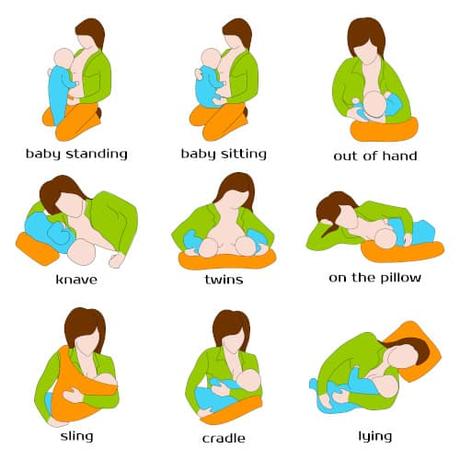I used to picture breastfeeding as this calm, angelic activity between a mother and her newborn.
Parenting websites told me it’s essential to form a bond between my baby and me. Parenting books taught me how beneficial for the baby’s health breastfeeding will be. Let’s say I had my expectations pretty high.
Yet, none of them told me I’d hear some weird sounds that’ll make me worry about my baby!
Is there something wrong with him?
Is he trying to tell me something?
Why is my baby squealing while breastfeeding?
I’ve done my research, scoured the internet resources, and asked pediatricians, all with the intention to get the surefire answer to all my breastfeeding-related concerns.
Ladies, I present you the definitive guide of why your baby’s squealing while breastfeeding, alongside the explanation -and solutions- of other common phenomena.
Let’s dive right in!
Content:
- What Is Squealing?
- What Causes Baby Squealing While Breastfeeding?
- Sounds While Breastfeeding
- The Baby Latch How-To
- Visit a Lactation Consultant
What Is Squealing?

Well, there’s a bunch of similar noises your baby can make that you might confuse for each other.
Between grunting, clicking, clucking, snorting, and humming, squealing is among the most unexpected sounds for a baby to make while feeding.
Squealing is that high pitched sound your baby makes sometimes. It might be during breastfeeding, interacting with something, or even during naptime!
The good news is, most of the time, babies squeal to express excitement (You might recall your baby doing that when you play with him or hold one of his toys.) On the other side, they might be squealing to express discomfort.
Which one is the case when it comes to squealing while breastfeeding? You ask. Well, it can be either of them!
What Causes Baby Squealing While Breastfeeding?
Your baby might be squealing while breastfeeding because of difficulty breathing -yes, worries moms, you win- but there’s also a good chance that he/she is just getting used to the whole breastfeeding thing.
He/she is learning to manage the milk supply just like you are!
Respiratory Issues
Your baby might be suffering from a respiratory condition that’s making it difficult for him/her to breathe while they’re feeding.
This can be due to a not-so-common disease of the tissue around the larynx and trachea.
Laryngomalacia
Laryngomalacia is a congenital abnormality in which the trachea’s tissue of the infant is remarkably soft.
Especially the tissue above the vocal cords. It literally translates into “soft larynx.”
When the baby inhales, this softness might cause the tissue to flop into the airway, partially blocking the airway, causing a squeaking sound.
How Can I Know If My Baby Has Larnygomalacia?
Well, the first obvious symptom is heavy audible breathing that’s known as stridor.
For those who are unfamiliar, stridor is a wheezing or high pitched sound that accompanies breathing.
With a possible partial blockage of the airway with every breath taken when a baby has Laryngomalacia, you can see why stridor is bound to happen.
You might hear this stridor only when the baby exhales, only when he/she inhales, or both ways. It’s normal.
You can detect it when the baby is sleeping on their back or when they squeal when breastfeeding.
How Can I Deal with Squealling due to Respiratory Disease?
No need to worry, though. It’s most likely that your baby will outgrow their soft-tissue larynx.
All you need to do is head to your pediatrician if you notice these symptoms recur consistently.
They’ll perform a small test, and they’ll give you a diagnosis. So that you know.
However, in most cases, there’s nothing to do other than wait for it to resolve on its own and be extra careful with your baby’s positioning while nurturing.
While feeding your baby, if you feel like he/she is struggling to swallow, try to gently pull out from their mouth, let them take a breath, burp them, then go on with the feeding.
Keeping Up with Milk Supply
Luckily, there are no other medical reasons for the squealing sound babies make while nursing.
No matter how advanced technology is becoming, nobody has figured out the language of babies yet.
However, we do know that there’s no direct relation between any serious medical condition and a squealing sound a baby makes while breastfeeding.
The thing is, babies make this sound when they’re either excited or nervous and while they’re fed, it could be both! It might be that your baby’s excited to be fed after being hungry for a while or that they can’t keep up with you.
The Let-Down Dilemma
The let-down reflex is a reaction of your breast to your child latching and sucking on it.
After a few sucks, a signal is sent to your brain to release the oxytocin hormone, which in turn results in milk ejection. This is also known as Milk Ejection Reflex (MER).
The thing is that breast let-down is hardly controllable, so instead of trying to control it in vain, you should adapt to it.
If you feel like your let-down is a bit too strong or too much for your baby, this might be it; the reason for the squeaky sound is that your baby can’t keep up with your flow.
How Do I Stop Squealing Due to Let-Down?
If that’s the case, you can pop off your baby when you feel the let-down. Let it flow into a piece of cloth or blanket, then latch your baby back on when your flow is regular.
Other women even spray their milk into containers, freeze it, and store it for later use! There’s no shame in good management.
Another tip that I found to be helpful was to try to pump out after the baby’s first feed in the morning.
This way, you’ll be letting off the day’s main let-down, and probably you won’t be having more rigorous fire-hydrant-like let-downs during the day.
Setting your baby in the right position is crucial if the problem is due to a forceful let-down.
Since gravity helps with the let-down, we need to position the baby to be opposing the force of gravity, in an uphill position. The key is to get your baby’s head and throat above the level of your nipples.
Your baby is new to this whole breastfeeding thing, just like you. He/she will need time to adapt and keep up with your flow. You, as well, will need time to figure things out. It’s a process. Don’t rush it.
Here are a bunch of uphill position that you can practice with your baby to mitigate the problem of a milk ejection reflex.
Modified Cradle Position
This is the regular cradle position where your arm supports your baby’s body pulling it to your chest.
Your baby’s head should be supported by your elbow. The modification is that you should lean backward so that your baby is in a higher position.
You can use a reclined chair or a bunch of pillows to be set in this position. I’ve found this wedge pillow to be perfect for back and neck support.
Side-Lying Position
As the name suggests, you lie on your side facing your baby. The baby’s mouth should be in line with your nipple.
Positioned this way, your baby will easily dribble any excess milk before you know it.
Laid Back Position
Claimed to be the “biological nurturing” position by its advocates, a laid-back breastfeeding position relies on a baby’s’ instinct to latch on a mother’s breast and feed.
For you, as a mother, it’s easier and more comfortable. All you have to do is lay on your back in a slightly reclined position. Put your baby on your body, tummy to tummy.
Your baby will then cling to your chest and start to latch on your breast. As for the milk ejection reflex, you can see how you’re positioned completely against its direction of flow!
It Might As Well Be .. Gas
In some situations, especially if your baby is getting in more air than milk, he/she might be making that squealing sound. Air in equals gas out!
When you’re nurturing your baby on one side for a long time, you’ll soon run out of milk, which results in air passing to the baby.
How Can I Stop Squealing Caused by Gas?
Make sure to regularly switch sides with your baby to ensure they’re benefiting from breastfeeding. Also, don’t miss the burping to rid him/her of any gas that might be annoying them.
What Is Burping and Why Do Babies Need It?
Burping releases trapped gas bubbles out of the baby’s body up the esophagus and out through the mouth. A burp can unpleasantly bring with it some of the stomach’s contents.
That’s when we call a wet burp, and that’s when your mother’s golden advice of burping with a towel or a piece of cloth comes handy!
Since its primary purpose is to get rid of gas, burping could be the long lost solution to your baby squealing while breastfeeding problems.
There are three ways to burp your baby.
#1 Hold your baby to your chest while you’re sitting or standing upright.
Your baby’s chin should rest on your shoulder while you use one hand to support him/her and the other to gently pat their back.
Movement while doing this -either walking or rocking- might help.
#2 Put your baby on your lap with his/her belly on down. Make sure that his/her head is supported and in a position higher than their chest, and gently pat their back.
#3 Sit your baby on your lap while you’re sitting upright. The baby should be facing away from you.
Use your palm to support their chest, chin, and jaw -don’t push against his/her throat, though- and gently pat against their back.
Sounds While Breastfeeding

Alongside squealing, there are two common sounds babies make while breastfeeding. I’ll explain them below.
Clicking
One of the most common noises babies make while nursing is that click sound. A ‘click’ is an indicator of a bad latch-on. It means that there’s air entering your baby’s mouth while feeding.
The good news is that this noticeable sound disappears once the baby latches correctly. Most of the time, it’s due to a tucked-in baby’s lip, while it should flare it out instead.
Something that we refer to as a “shallow latch.” It’s basically when your baby latches on without getting enough breast tissue in his/her mouth.
With this improper latch, your baby won’t get enough milk. In an attempt to get more milk, they’ll suck harder and compress your breast. This can be quite painful!
Another less common cause for the clicking is an ear infection.
If your baby’s ear is inflamed, sucking will create some sort of pressure over it, which is uncomfortable for your baby.
The same reaction might happen when teething. Your baby is trying to communicate that he/she is uncomfortable through that clicking sound.
Dimpling Cheeks
In the case of an improper latch-on, you might notice that your baby dimples his/her cheeks.
This is another common symptom that accompanies the clicking sound when there’s a problem with the baby’s latch. In this case, your baby probably isn’t sucking properly.
There are various reasons for that.
It might be that your nipples are sore, which is -in and of itself- a symptom of a wrong baby position and a poor latch on.
Grunting
Grunting is a short angry pig-like voice made by the baby to indicate effort. By the time your baby starts grunting, he/she will be getting to know their own bowel movement.
The most common cause of grunting is a fast let-down reflex. You know how to manage that by now, don’t you?
The Baby Latch How-To

At first, it might be overwhelming, but after some practice and some not-so-successful trials, you’ll do it naturally.
Breastfeeding is a beautiful bonding activity in which you engage with your baby. Here’s how to position your little one correctly.
The rule of thumb is that the baby should be facing your breast. They should have at least a full inch of breast tissue in their mouth.
Ideally, we want the baby’s tongue to lie flat on their lower lip or gum line before latching onto the mother’s breast.
If you, or the baby, aren’t quite comfortable with how he/she is positioned against you, use pillows. There’s a wide variety of nursing pillows for good prices available online.
You can put them on your lap to raise your baby to your level, behind your back, or below your arms for support.
As for the baby’s lips, they should be both flared outwards. Like I said before, an inward bent lip might hinder suction and result in a clicking sound or dimpling cheeks. Not to mention sore boobs!
When and How to Stop
If you’re following the instructions of baby positioning while breastfeeding by the book and you still feel there’s a problem with you or your baby, then you should abort the mission.
Insert your clean pointer finger into the side of your baby’s mouth to break the suction. Then, try again. If the problem remains, you should opt for a professional.
Visit a Lactation Consultant

If your baby’s squealing sound persists for a long amount of time, or if you’re facing any other challenges while breastfeeding your little one, you should visit a lactation consultant.
A lactation consultant -shortly known as an LC- is a specialist on lactation issues. They’re mostly women, and they might be nurses, doctors, or neither. The preference is of those with a medical background, of course.
What Does a Lactation Consultant Do?
An LC will assess your breastfeeding technique and help spot any wrong practices that might be making the process bothersome for you or your baby.
LCs teach mothers and women who are expecting how to deal with their newborns, alongside best breastfeeding techniques for both the mother and the baby.
In case you decide on going to a breastfeeding class with a lactation consultant, your learning goals should be the following.
- How to know that your baby is hungry.
- How to tell if your baby’s had enough milk.
- How to manage your milk supply.
- How to tell if there’s something wrong with your baby.
- When to start introducing other food forms to your baby.
- How to deal with latching problems and nursing difficulties.
Needless to say, you don’t need to be having a problem with your baby to pay a visit to a lactation consultant.
It can be something to help you master a skill that you definitely have no prior experience with!
When to Visit a Lactation Consultant
In addition to a consistent baby squealing sound while breastfeeding, here are three reasons why you might need the services of a lactation consultant.
Your Baby Isn’t Gaining Weight
While it’s common for newborns to shed off a few ounces after delivery, it’s not a good sign not to gain weight afterward.
If you notice that your baby isn’t gaining weight properly, you should check with your pediatrician and your lactation consultant. Especially if the baby relies solely on breastfeeding and no formula.
In most cases, it’s a problem with the baby’s latching on. It’s rarely due to low milk supply. The majority of mothers have a milk supply that’s sufficient for their babies.
Your Breasts Hurt or Your Nipples Are Sore
Nipple pain is common among new mothers, especially right after giving birth. Typically, you’ll experience mild pain when your baby first latches on your breast for around 30 to 60 seconds, and then it wears off.
This is normal, but if it doesn’t go away after two weeks, then we might be looking at a problem.
If the pain lasts throughout the whole breastfeeding session or between feeds, you should see a lactation specialist. The same applies if you experience skin cracks or bleeding.
Breastfeeding shouldn’t be painful. If you can’t tolerate the pain, then there’s probably something wrong with you.
It might be engorgement, a condition where your breast tissue is overloaded with milk and blood, leading them to feel hard, heavy, and painful. Luckily, there’s a cure for this condition.
Finally, it might be a problem with your baby’s latch on, or he/she might be tongue-tied, a common condition among 4% to 11% of babies.
In some cases, it resolves on its own, while it needs surgery in other cases. A lactation specialist might help you spot it.
You Can’t Manage Your Milk Supply
Many moms go to lactation consultants thinking that they have a low milk supply, or that they can’t manage an overflowing milk supply.
This is completely normal for new moms, and lactations consultants are there to deal with just that.
As we established before, when you feel like your milk supply isn’t enough for your baby, it’s probably a symptom of another problem with how you nurture him/her.
Rarely do we encounter an actual low milk supply problem. Yet, an experienced LC will know how to distinguish between the two.
On the flip side, if you’re struggling with oversupply, you need to learn how to manage your supply.
Usually, you can do this by learning some compression techniques and how to decrease your pumping gradually.
You may also need to learn how and when to stop and burp your baby while feeding them so that they don’t choke over milk.
Where to Find a Lactation Consultant
You get info about all certified lactation consultants on the International Lactation Consultant Association website. You can find them in hospitals, clinics, or their own private practice.
Parting Thoughts,
Motherhood is overwhelming, not to mention if it’s your first baby. It’s normal to be worried, but don’t let that wash over you.
There you have it, my two cents on why your baby might be squealing while breastfeeding.
I hope you’ve learned a thing or two about breastfeeding along the way!
Experts say that mothers need an average of 20 to 30 sessions of breastfeeding to master the thing. So don’t expect to experience perfect nursing overnight. That’s definitely a myth!
